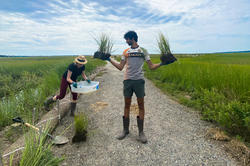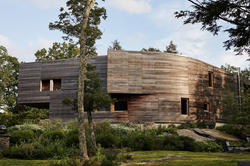NCSS Concentration

As one of RISD’s largest undergraduate concentrations, Nature–Culture–Sustainability Studies (NCSS) provides an opportunity for students to shape individualized courses of study focused on interdisciplinary environmental learning in an art and design context. Through the 21-credit concentration, you can focus on biomimicry, emerging technologies, global warming, hybridity and sustainability, among other options.
Concentration specifics
About
Housed in and administered by the Liberal Arts division, NCSS is an all-college interdisciplinary concentration. The concentration allows students to create their own pathway of study drawn from the fields of: sustainable design, the environmental sciences and social sciences, the environmental humanities, social and environmental justice studies and the fine arts. Courses that can earn NCSS credit and are open to NCSS concentrators are identified as such in the RISD course catalog. All concentrators will complete a 3-credit core course in Nature-Culture-Sustainability Studies—The NCSS Core Seminar.
Typically, concentrators meet or communicate with their concentration coordinator once or twice a year to discuss course options and to update their records. NCSS concentrators may pre-register for a select range of Liberal Arts courses that are identified in the RISD course catalog with the NCSS course tag. Concentration coordinators will contact all concentrators with the relevant instructions shortly before the official registration period. This pre-registration option is available in fall and spring only.
Interested students should complete the concentration declaration form at the bottom of this page.
Learning and making objectives
NCSS program objectives are designed to emphasize the concentration’s inherent interdisciplinarity and its efforts to bring liberal arts and studio learning together in an art and design context around shared environmental topics and concerns. The learning and making objectives of the NCSS concentration are to enable students to:
- identify Nature-Culture-Sustainability Studies as an inherently interdisciplinary pursuit by synthesizing knowledge from the humanities, sciences, social sciences and art and design to analyze a variety of environmental challenges.
- apply this interdisciplinary knowledge to their studio practices in order to develop and create innovative art- and design-based responses to complex environmental challenges.
- explain, analyze and critically evaluate a diversity of theoretical frameworks, methodologies and making practices—and their intersections.
- describe and apply key concepts and debates underlying theories of sustainability.
- formulate a critical understanding of and be able to communicate the ways aesthetics, objects, systems and language interact with culture, power relations and institutions to shape our perceptions of and relationships with the natural and built world.
- demonstrate an ability to assess the ethical implications of the theories and methodologies discussed and identify, evaluate and articulate their own socio-ecological identity and positionality within them.
Curriculum
To satisfy the requirements of this interdisciplinary undergraduate concentration, students will complete a minimum of 21 credit hours of relevant coursework with a B- or above. RISD students will be able to ‘double count’ up to 9 credits of courses they have taken in their major as NCSS courses as long as such courses are identified as fulfilling NCSS requirements.
9 credits electives from Liberal Arts that cover NCSS topics
9 credits double counted from your major (as long as such courses are identified as fulfilling NCSS requirements)
3 credits from the NCSS Core Seminar. This course will receive credit as a non-major studio elective cross-listed in the Liberal Arts, Fine Arts and Architecture and Design divisions. Students may distribute their remaining credits for the concentration according to their individual needs and creative passions.
The NCSS concentration can be completed within a 4-or 5-year degree program.
Course petitioning
- RISD students will be able to petition their NCSS coordinator to request consideration for NCSS credit for work completed in courses that are not designated NCSS. Students need to demonstrate and document to the satisfaction of their NCSS coordinator that their work is substantively informed by the themes of the concentration.
- Brown classes may qualify for NCSS credit. Concentrators may petition for inclusion of these classes by submitting a request to the concentration coordinator that includes the course description and other relevant information.
- NCSS concentrators may also petition their concentration coordinator for the inclusion of studio classes from a non-major studio elective by virtue of the way the student chooses to do the work in that studio. If the content of the student’s work reflects the learning goals of the NCSS Concentration, then the course’s six credits may qualify for NCSS credit. The minimum grade for NCSS credit of B- still applies
Please use the Course Petition Form to count your courses towards NCSS
Course transferring
- NCSS concentrators will be able to transfer a maximum of 6 credits from other universities to fulfill their NCSS concentration requirements; all these courses must receive at least a B-, or in the case of universities where letter grades are not issued, a passing grade.
- All 4-credit courses from other universities will transfer into this concentration as 3-credit courses.
- Discretion regarding whether courses from other universities meet the standards for an NCSS course rests with the NCSS concentration co-coordinators.
Please use the Course Petition Form to transfer your courses.
Contact
Sage Gerson
Assistant Professor
NCSS Concentration Coordinator for first-year and sophomore students
ncss-first-soph@risd.edu
Anastasiia Raina
Associate Professor
NCSS Concentration Coordinator for junior and senior students
ncss-juniors-seniors@risd.edu
Student work




Recent stories
Manini Banerjee, Varun Mehta, Avantika Velho and Katia Zolotovsky are developing mycelium-based biofiltration pods capable of reseeding lost wetlands.
Industrial Design students offer innovative ideas for supporting sustainability in Rhode Island and beyond.
A multidisciplinary team builds on research conducted in the spring linking advanced technologies, public environments and personal experience.
A RISD team creates a stunning, energy-efficient getaway in New York’s Catskill Mountains.
RISD students and recent grads are using design thinking skills to support positive change in Africa, Asia and North and South America.




